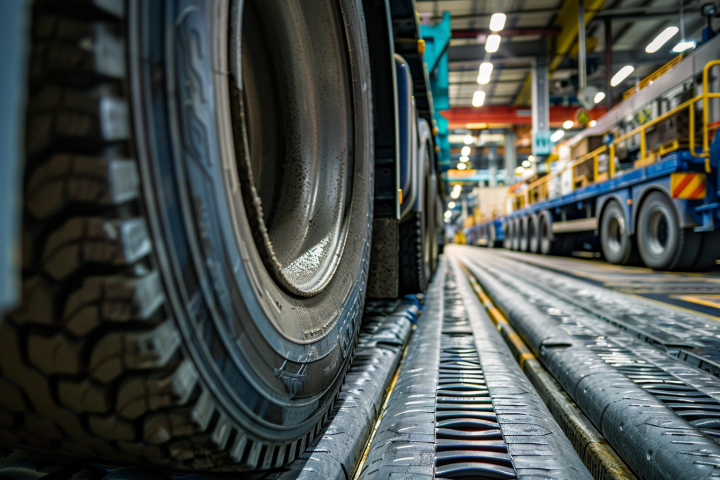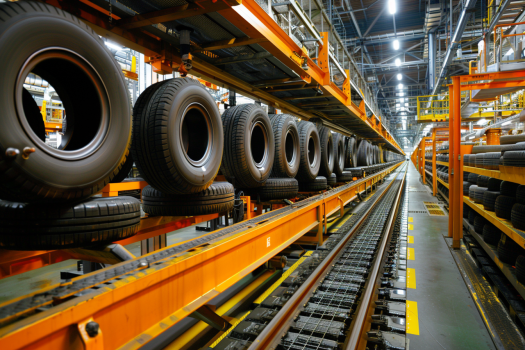Last Updated on September 21, 2025
Unveiling the Truck Tire Manufacturing Powerhouses
Welcome to a comprehensive overview of the top truck tire-producing regions globally. This essay will analyze the importance of high-quality truck tires while providing a thorough overview of the world’s tire manufacturing industry. Together, we will explore the manufacturing giants essential to maintaining the effectiveness and safety of trucking operations.

The Importance of Quality Truck Tires:
Truck tires are the unsung heroes of the road. They significantly affect cargo’s safe and efficient movement over long distances. There are various reasons why high-quality truck tires are crucial.
- Safety First: Protecting other road users, goods, and drivers is crucial. Better handling, grip, and stability provided by high-quality truck tires lowers the chance of collisions, particularly in inclement weather.
- Economic Efficiency: Fuel consumption can be decreased by using efficient truck tires. Premium tires and regular fleet maintenance can dramatically reduce operating expenses, which benefits the bottom line.
- Durability and Longevity: High-quality tires are built to resist the demands of long-distance trucking. They reduce the need for tire replacements by providing durability and increasing tread life.
The Global Tire Manufacturing Landscape:
To understand where the industry’s powerhouses are located and why, one must understand the global tire production environment. Global leaders in tire production have developed from several crucial places, including:
- Asia-Pacific: The hub of the world’s tire production is the Asia-Pacific area, which China, Japan, and India dominate. China is the world’s largest tire producer because of its massive industrial capacity and affordable manufacturing methods.
- North America: The US is home to several enormous tire manufacturers that substantially contribute to the sector. Canada is also a significant player in the tire industry.
- Europe: High-end tire manufacturing is synonymous with nations like Germany and France, renowned for their accuracy and performance.
- South America: With solid track records, Brazil and Argentina are rising stars in tire manufacturing.
- Africa and the Middle East: While these regions may not dominate global production, they house niche markets and manufacturing facilities, adding diversity to the industry.
Why Location Matters
Location matters significantly in various industries, including manufacturing, and the tire industry is no exception. The geographical placement of tire manufacturing facilities impacts factors like cost-efficiency, resource accessibility, proximity to major markets, and overall competitiveness. Choosing the right location can result in reduced production costs, a quicker response to market demand, and a strategic advantage in the highly competitive tire manufacturing landscape. This article will delve into the critical factors influencing tire manufacturing locations and the impact of proximity to major markets on the industry.
Factors Influencing Tire Manufacturing Locations:
The location of tire manufacturing facilities is a critical factor that can significantly impact the success and efficiency of a tire production operation. Several key factors influence the choice of location for these facilities:
- Access to Raw Materials: It is essential to be close to the necessary raw materials, namely, natural rubber. Regarding availability and affordability, areas with easy access to rubber plantations and other resources are clearly at a significant advantage.
- Skilled Labor: It is crucial to have a knowledgeable and skilled labor force with experience in tire production procedures. Businesses typically shop in areas with a ready supply of qualified workers in the needed fields.
- Transportation and Infrastructure: Enough infrastructure, including transportation networks and logistics centers, is required to flow raw materials and finished goods efficiently. Places with advanced transit infrastructure are favored.
- Energy Source: As the production of tires often requires significant energy-intensive procedures, a reliable and inexpensive energy source is essential. It is preferred to establish production facilities in areas with dependable power supplies.
- Regulations Concerning the Environment: Tight environmental restrictions influence where tires are made. Businesses look for areas where laws balance industrial output with ecological preservation.
- Closeness to Vendors: Locating suppliers of necessary components, such as chemical compounds, steel belts, and textiles, can minimize transportation costs and lead times.
- Demand from the Market: Being close to important markets and distributors is critical. You can save on shipping prices and delivery times by placing yourself close to tire-intensive locations, like metropolitan centers and transportation hubs.
The Impact of Proximity to Major Markets:
Their proximity to essential markets heavily influences the placement of tire production plants. This is how the difference is made:
- Lower Shipping Prices: Locating closer to essential markets allows us to transport completed tires to their destination at a lower cost. This can save significant money, mainly if working with many tires.
- Rapid Response to Requests: Nearby manufacturing facilities enable them to react faster to shifts in consumer demand. This is necessary adaptability in the very competitive tire market.
- Just-in-Time Production: Just-in-time production minimizes storage costs and the possibility of overproduction, which is made possible by proximity. Tires are produced as needed.
- Customer Service: Being close to customers enables better customer service. Manufacturers can offer quicker delivery times, address customer concerns promptly, and build stronger relationships.
- Market Research and Innovation: Being near major markets provides access to valuable market insights, helping manufacturers tailor their products to meet specific regional needs and preferences. It also facilitates innovation and product development based on market demands.
Asia-Pacific: A Truck Tire Manufacturing Powerhouse
Asia-Pacific has become a significant player in the tire sector, with many vital countries playing key roles. In this part, we will examine the area’s tire manufacturing environment, emphasizing China, Japan, and India.
China: The World’s Largest Tire Producer:
China is now clearly the world’s top tire producer. China leads the global tire market thanks to its extensive industrial capacity, affordable manufacturing methods, and wide range of tire options.
- Huge Industrial Capacity: China’s enormous industrial capacity has allowed it to establish itself as the world’s largest tire maker. The nation has many tire manufacturing facilities, ranging in size from local businesses to major international conglomerates.
- Cost-Effective Production: Tire manufacturers worldwide have been drawn to China because of its affordable production techniques. Cheap labor and resources are readily available, which boosts its competitiveness in the international market.
- Broad Product Selection: Chinese tire producers provide many tires, ranging from budget-friendly models to high-end names. This growth in variety serves a range of domestic and international consumer requirements.
- Export Dominance: China is a significant exporter of tires, which are sold all over the world. Thanks to this export-oriented strategy, China is already a substantial producer of tires.
Japan: Precision and Innovation in Truck Tire Manufacturing:
Japan is well known for the accuracy and creativity of its tire manufacturing sector. High-quality, dependable tires with cutting-edge innovations and safety features are produced by Japanese tire manufacturers, who place a high value on technical excellence.
- Precision Engineering: The tire manufacturing sector in Japan is well-known for its precision engineering. Japanese tire manufacturers produce high-quality, dependable tires by giving precision the utmost importance in their production processes.
- Innovation Hub: Regarding tire technology and innovation, Japanese tire producers. They invest significantly in research and development to produce cutting-edge tires renowned for their performance and safety characteristics.
- High-End Market Focus: Japan’s tire industry often caters to the high-end market, producing premium tires that meet the demanding requirements of luxury vehicles and sports cars.
- Global Presence: Japanese tire companies have a global presence, supplying tires to various markets and partnering with automakers worldwide. Their reputation for quality and innovation sets them apart.
India’s Innovation in the Global Market:
India is becoming a significant force in the world tire market. Thanks to its economic advantages, skilled labor, and varied tire manufacturing spectrum, India is becoming a rising star in the tire manufacturing industry. India’s impact on the global market is growing.
- Emerging Manufacturing Hub: India has become a more significant player in the global tire manufacturing scene. The nation provides both skilled labor and economic benefits.
- Wide Variety: Indian tire producers make many tires for trucks, off-road vehicles, and passenger cars. Their adaptability enables them to serve a wide range of clients.
- Quality Focus: Indian tire companies are progressively improving product quality, meeting international standards, and enhancing global competitiveness.
- Export Growth: India’s tire exports have steadily increased, with Indian-made tires being shipped to various countries. This growth signifies India’s rising influence in the global tire market.
North America: Home to Leading Tire Manufacturers
The United States and Canada are significant players in the tire industry, making North America a substantial hub for tire production. This section will examine North America’s tire manufacturing industry, particularly emphasizing the United States and Canada.
USA: Tire Manufacturing Giants on American Soil
The US-based tire giants are essential to the sector. These businesses run a range of manufacturing sites, which adds to the selection of tires available to consumers. The USA maintains its status as a significant hub for tire production thanks to its widespread respect for quality and innovation.
- Diverse Manufacturing Innovation The US has a diverse tire manufacturing landscape, with domestic and foreign tire businesses working there. Because of this variety, customers can choose from many tires.
- Global Presence: Many American tire manufacturers have an international presence, exporting their products to markets worldwide. They are often known for producing high-quality tires that meet stringent safety and performance standards.
- Innovation and Technology: American tire manufacturers prioritize these two areas and always look for ways to enhance tire design and production procedures. As a result of this dedication to innovation, modern tire technologies have developed.
- Industry Associations: To further improve the industry’s reputation, organizations like the Rubber Manufacturers Association (RMA) and the Tire Industry Association (TIA) encourage and promote best practices in the tire manufacturing sector.
Canada’s Contribution to the Truck Tire Industry:
The truck tire sector has greatly benefited from the efforts of Canadian tire makers. Truck tires made in Canada are well known for their strength and quality, and they easily meet the demands of rough terrain. Canada is a critical player in the tire industry in North America, providing a consistent supply of high-performance tires for the transportation industry.
- Reputable tire Manufacturers: Canada has many reputable tire manufacturers who have made significant economic contributions to the nation. These businesses produce numerous tires, particularly those for trucks and commercial vehicles.
- Quality and Durability: Truck tires manufactured in Canada are renowned for their high caliber and resilience since they are built to resist the harsh road conditions found in the nation. Their dependability makes trucking companies favor them frequently.
- Export countries: Canadian tire manufacturers expand their market penetration and influence in the global truck tire industry by exporting their products to several nations.
- Research and Development: Canadian tire companies engage in research and development to enhance tire performance, fuel efficiency, and environmental sustainability.
Europe: Precision and Performance
Europe is known in the tire industry for its high performance and precision engineering standards. This section examines the European tire manufacturing market, particularly in France and Germany.
Germany’s Engineering Excellence in Tire Production:
Germany is renowned for its superior engineering in the tire industry. Prominent for accuracy and superiority, German tire manufacturers prioritize technological know-how and inventiveness in their manufacturing procedures. These tires frequently demonstrate the nation’s dedication to tire engineering by excelling in performance, safety, and longevity.
- Technical Prowess: Germany is known for its superior engineering, and this reputation carries over into the tire industry. Technical know-how and accuracy are given top priority in the production processes of German tire manufacturers.
- Superior Materials: German tire producers frequently combine state-of-the-art technology and superior materials to produce tires that are exceptionally safe and perform well. These tires are made for various automobiles, such as trucks and commercial vehicles.
- Innovation at its Foundation: The German tire industry is built on innovation. Companies actively engage in research and development to introduce cutting-edge innovations that improve grip, handling, and performance.
- Sustainability Main Idea: Concern over sustainability in the tire business is growing. German producers are working hard to produce environmentally friendly tires with less rolling resistance and a lower carbon footprint.
France: Balancing Tradition and Innovation:
France maintains a careful balance between heritage and innovation in tire manufacturing. With its long history in the tire industry, French tire producers blend creativity with cutting-edge tire design. As a result, many high-end tire brands are well-known for combining heritage, cutting-edge technology, and superior on-road performance.
- Vast Tire-Making Legacy: tire production has a long history in France; certain businesses have operated since the early 1900s. This heritage instills in the sector a feeling of tradition and craftsmanship.
- Innovative tire Design: French tire producers successfully combine innovation and tradition. The creation of Innovation combines cutting-edge tire design with its tradition to provide exceptional road performance and safety.
- Premium tire Brands: Trucks and commercial vehicles are among the many cars for which France is renowned for developing premium tire brands. These tires frequently place a high value on noise reduction, comfort, and durability.
- Research and Development: French tire companies invest in research and development to create innovative tire solutions, such as all-season tires and tires with advanced tread patterns that provide superior traction.
South America: Emerging Players
Each day, South America’s prominence in the world’s tire manufacturing scene grows. This section will examine the developments in tire production in South America, emphasizing Brazil and Argentina.
Brazil: Emerging as a Tire Manufacturing Hub:
Brazil is becoming a significant base for South American tire production. Tire firms from domestic and foreign markets have been drawn to the country by its natural rubber resources and industrial growth in the tire sector. Brazilian producers’ variety of tires—including tires designed specifically for trucks and commercial vehicles—contributes to their increasing market share worldwide.
- Industrial Expansion: South America’s tire manufacturing hub, Brazil, has come a long way. Tire manufacturing facilities, both domestic and foreign, have expanded industrially throughout the nation.
- Plenty of Natural Rubber: Rubber tree plantations in Brazil are the source of a plentiful supply of natural rubber, a significant draw for tire producers. This easily accessible resource lowers manufacturing costs and guarantees a steady supply of raw materials.
- Economic Incentives: The Brazilian government has implemented financial incentives to promote domestic tire production, encouraging investments from domestic and international tire companies.
- Product Range: Brazilian tire manufacturers produce many tires, including those for trucks and commercial vehicles. These tires often cater to the specific needs of the South American market, with a focus on durability and performance in diverse terrains.
Argentina’s Growing Presence in the Global Market:
The tire manufacturing industry in Argentina is expanding steadily and becoming increasingly visible worldwide. Argentina’s tire manufacturers are known for their high-quality production that satisfies global standards, emphasizing local and foreign markets. Their increasing influence in the international tire sector can be attributed to their export-focused policies and dedication to innovation.
- Steady Growth: The manufacturing industry has been expanding steadily, concentrating on local and foreign markets. The nation has become a significant player in the South American tire market.
- High-quality Manufacturing: Tire producers in Argentina are renowned for creating high-quality tires that adhere to global standards. The goods are engineered to endure the rigors of diverse road and climatic conditions.
- Tire business in Argentina: With a growing emphasis on exports, the country’s tire business now supplies tires to foreign and neighboring markets. This export-oriented strategy can be attributed in part to its expanding global prominence.
- Technology Investment: The Argentinean industry invests in technology and innovation to increase fuel efficiency, innovative rolling resistance, and tire performance.

Africa and the Middle East: Niche Markets
Although not dominant players in the global tire manufacturing landscape, Africa and the Middle East serve niche markets uniquely, this section will delve into tire manufacturing in South Africa and the Middle East, focusing on their distinct contributions.
South Africa: Tire Manufacturing on the African Continent:
South Africa is an essential center for tire production. By manufacturing tires for both its home market and its neighboring nations, it serves as a gateway. With an emphasis on performance and durability, South African tire producers contribute to the continent’s tire sector thanks to their access to natural rubber resources and dedication to quality.
- Gateway To Africa: The entrance to Africa’s tire industry enters the continent through South Africa. It is home to multiple tire manufacturing facilities that serve both the domestic market and the continent’s neighboring nations.
- Access to Raw Materials: The nation’s ability to obtain natural rubber and other necessary raw materials helps boost domestic tire manufacturing and lessen import dependency.
- Quality and Standards: South African tire manufacturers adhere to international quality and safety standards, ensuring that their products meet the requirements of both domestic and export markets.
- Diverse Product Range: South African manufacturers produce various tires for trucks and commercial vehicles. They often prioritize durability and performance to meet the demands of multiple terrains across the continent.
The Middle East’s Role in High-End Tire Production:
The Middle East is a significant producer of premium tires for the luxury and performance car markets. Several nations in the area specialize in producing high-end tires, emphasizing export-oriented tactics, innovation, and customization. These innovative tires, renowned for their cutting-edge technology and outstanding road performance, enhance the region’s standing in the international tire sector.
- Focus on High-End Markets: High-end tire production is among the Middle East’s best-known industries. Tire producers in several of the region’s nations specialize in premium and luxury car tires.
- Customization and Innovation: Tire businesses in the MInnovation concentrate on customization and innovation, making their goods specifically designed to satisfy the demands of luxury and high-performance cars. To improve comfort and handling, this incorporates cutting-edge tire innovations.
- Export-Oriented: With an eye on exports, many Middle Eastern tire producers sell premium tires to international markets. They maintain a significant presence in the global aftermarket and frequently work with luxury automakers.
- Research and Development: The Middle Eastern tire business makes significant investments in this area to stay on the cutting edge of tire technology, focusing on performance and safety features.
Challenges and Opportunities
The process of making tires uses many resources and presents several environmental problems. However, it also offers opportunities for environmentally conscious design and sustainable innovation. Let us examine both Innovation matters.
Challenges:
- Natural Rubber Sourcing: Unsustainable rubber cultivation methods can result in deforestation and habitat loss, a significant supply source for the tire business.
- Energy Consumption: Producing tires uses a lot of energy, which raises world energy consumption and greenhouse gas emissions. This carbon impact must be reduced.
- Waste Generation: Chemical byproducts and scrap rubber are produced throughout tire manufacturing. These items must be disposed of and recycled correctly to preserve the environment.
- Chemical Usage: If chemicals are misused throughout the tire-making process, contamination may result. It is essential to ensure the responsible handling and disposal of chemicals.
Opportunities for Innovation:
- Sustainable Materials: Using eco-friendly and sustainable materials, including recycled content and bio-based rubbers, can lessen the environmental impact of tire manufacture.
- Energy Efficiency: Manufacturers can invest in renewable energy sources and energy-efficient technologies to reduce carbon emissions and energy consumption.
- Circular Economy: A circular economy strategy can be implemented in various ways, such as recycling used tires into new ones, cutting waste, and conserving resources.
- Eco-Friendly Production Processes: By investigating more environmentally friendly and cleaner production techniques, environmental damage can be reduced.
Opportunities for Innovation in Tire Production:
There is much room for innovation and advancement in the technology sector. These changes may result in the creation of tires that are more sophisticated and effective:
- Advanced Materials: New materials, such as compounds impregnated with silica and nanotechnology, can improve tire performance, safety, and fuel efficiency.
- 3D Printing: By lowering waste and expenses, additive manufacturing processes such as 3D printing can produce tires that are customized and needed when needed.
- Innovative tire Technology: By combining cutting-edge technology and sensors, real-time information on tire conditions can be obtained, improving safety and maintenance.
- Automation: Automation can lower production costs and increase precision in tire manufacturing operations.
- Green Manufacturing: Tire production can have a less negative environmental impact using environmentally friendly manufacturing techniques, such as water recycling and low-emission procedures.
Conclusion & Recommendation
Exploring the world’s tire manufacturing scene has shown us a dynamic and varied sector. We have investigated important global areas with unique advantages and contributions to the truck tire industry. The tire business is a worldwide network of excellence, from Asia-Pacific’s massive manufacturing capacity to Europe’s precision engineering and the up-and-coming companies in South America, Africa, and the Middle East.
A Recap of Key Global Tire Manufacturing Regions:
Asia-Pacific, which China, Japan, and India dominate, is the world’s manufacturing powerhouse thanks to its innovative and economical manufacturing techniques. Leading tire producers are based in North America, especially in the USA and Canada, and are renowned for their wide range of products. Europe provides high-quality tires because of Germany’s engineering expertise and France’s heritage and creativity. Brazil and Argentina, as representatives of South America, offer distinct advantages to the industry’s expansion. Africa caters to niche markets, with South Africa serving as its manufacturing hub and the Middle East concentrating on high-end output.
The Future of Truck Tire Manufacturing:
Looking ahead, the future of truck tire manufacturing promises exciting developments. Sustainability will remain a top priority, focusing on eco-friendly materials and processes. Innovations like 3D printing and intelligent tire technology will reshape production methods and enhance performance. The industry will increasingly adopt automation, leading to precision and efficiency improvements.
As we conclude this comprehensive guide, we recommend that you consider the specific needs of your trucking operations when choosing tires. Each region offers unique advantages and tire options, so selecting tires that align with your requirements for durability, performance, and cost-effectiveness is essential.
Make the Right Choice with Tires Easy Truck
Tires Easy Truck (https://www.tires-easy-truck.com/) is your trusted partner for high-quality truck tires. With a wide selection of tires designed to meet various road conditions and performance needs, we ensure that you have access to the best options. Make the right choice for your trucks and your business. Click below to explore our tire catalog and get the best tires for your needs.
Thank you for joining us on this informative journey through the world of truck tire manufacturing. We look forward to serving you with top-notch tire solutions for your trucking needs.
FAQs
Who is the largest tire manufacturer in the world?
Bridgestone Corporation, the largest tire manufacturer worldwide, is a Japanese multinational company known for its extensive global presence and diverse tire product offerings.
How many tire factories are there in the world?
The global tire industry consists of numerous tire manufacturing facilities worldwide. The exact number of tire factories can vary as new facilities are established and existing ones expand or close.
What state produces the most tires?
Several U.S. states have historically been significant in tire production, with states like Ohio, South Carolina, and Tennessee hosting major tire manufacturing facilities. However, specific production figures may vary over time.
How many Truck Tire manufacturers are there in the world?
The global tire industry includes numerous manufacturers, ranging from major multinational corporations to smaller, specialized producers. The exact number of tire manufacturers can fluctuate based on market dynamics.
How do you choose semi-truck tires?
Choosing the right semi-truck tires involves considering factors such as tire size, load capacity, tread pattern, road conditions, and budget. It’s crucial to match the tire specifications with the specific needs of your trucking operation to ensure safety and performance.










